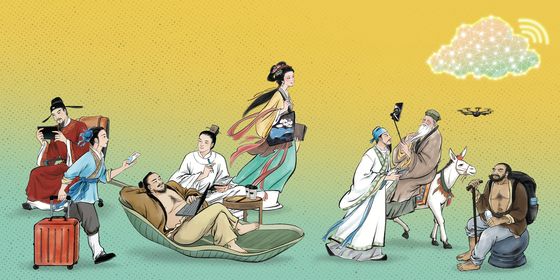Slang for the idle dreamers of the internet
“We are all dream-seekers,” President Xi Jinping said in his televised New Year greetings to the nation in December 2019. From alleviating poverty to space exploration to the all-encompassing “Chinese Dream,” the nation has never been afraid of big aspirations.
Regular folks, too, like to announce ambitious changes to their lives at the year’s start. But while plans to read more books and hit the gym don’t sound nearly as grand as rejuvenating the entire Chinese nation, they often prove just as hard to fulfill. Anyone who discards their resolutions 24 hours into the New Year are fair game to be dubbed a 光想青年 (guāngxiǎng qīngnián, think-only youth)—an idle dreamer who is all talk, and no action.
This term first emerged ahead of the “618” online shopping festival on June 18, 2019. To promote the event, online shopping site Tmall asked Weibo users about personal resolutions that they’ve failed to uphold. “To have an ideal life, don’t just think about it (理想生活别光想, lǐxiǎng shēnghuó bié guāng xiǎng),” the e-commerce platform concluded as thousands shared their stories of abandoned travel plans and discarded diets, perhaps implying that youths can at least take advantage of deals to get some merchandise they’ve been dreaming about.
The phrase is often used in gentle mockery. For instance, when a friend talks for the umpteenth time about wanting to do repairs around the house or learn a new language, without making any apparent progress, you can tell them, “Stop thinking and take action! (别做光想青年了,你倒是行动啊!Bié zuò guāngxiǎng qīngnián le, nǐ dǎoshì xíngdòng a!)”
Sometimes, though, dreams are just pleasant fantasies, all the nicer when there’s no obligation to make them reality. Next time you’re being nagged to make some self-improvement, the term 意念 (yìniàn, by mind) is a good retort. For instance, you can justify binge eating during your diet by saying you’re practicing “mental weight-loss (意念减肥 yìniàn jiǎnféi).” The popular phrase 意念回复 (yìniàn huífù, mental reply) is the perfect excuse for forgetting to respond to your instant messages and emails, or ignoring them: “请相信,我看到你消息的时候用意念回复了。(Qǐng xiāngxìn, wǒ kàndào nǐ xiāoxī de shíhòu yòng yìniàn huífù le. Believe me, I already replied in my head after I saw your message.)”
Some people are critical of this seeming lack of “can do” attitude among today’s youthful dreamers: The expression 嘴炮式恋爱 (zuǐpàoshì liàn’ài, romance by lip service) is a self-deprecating term among so-called 倔强式单身 (juéjiàngshì dānshēn, stubborn singles), who are addicted to romance dramas and want to find a partner, but feel afraid to commit to a relationship and often reject their would-be wooers.
Others, though, view dreaming youths more sympathetically. “If a person has no dreams, how do they differ from ‘salted fish?’ (做人如果没有梦想,和咸鱼有什么区别呢?Zuòrén rúguǒ méiyǒu mèngxiǎng, hé xiányú yǒu shéme qūbié ne?)” asks a popular internet meme, suggesting that idle dreamers are a compromise between stressed-out overachievers and “salted fish”—slang for young people who no longer have any ideals, having been driven to despair by high house prices, low career prospects, and other pressures of modern life.
“It is still necessary to have dreams; what if they come true? (梦想还是要有的,万一实现了呢? Mèngxiǎng háishì yào yǒu de, wànyī shíxiànle ne?)” another meme concludes on the importance of being a thinking-only youth. So shoot for the stars: You can at least imagine that you’ve landed among them.
Living the Dream is a story from our issue, “Grape Expectations.” To read the entire issue, become a subscriber and receive the full magazine.












